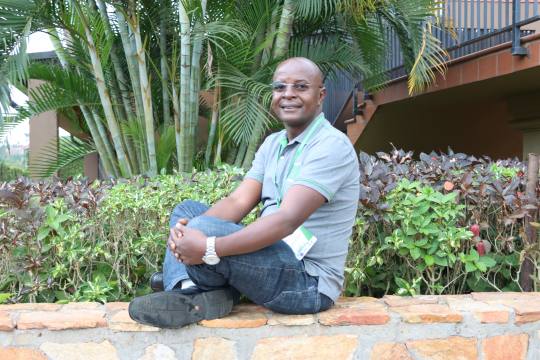At first, Edward Bbaale, Director of EfD Uganda, was hesitant to accept the challenge of arranging EfD’s Annual Meeting, knowing what a big undertaking it is and the high quality of previous meetings. Now he is very happy that he did. The participation of the Swedish Embassy has, among many other benefits, opened doors to the Ugandan government.
“We will have much better chances to have an impact on policies now,” says Edward Bbaale.
Gunnar Köhlin introduced Edward Bbaale to the Swedish Ambassador, Maria Håkansson prior to the meeting. She participated in the opening ceremony of the Annual Meeting and the Swedish Embassy will continue to collaborate with the EfD center.
“The embassy is involved in many projects related to environment and development and there are great opportunities for joint projects,” says Edward Bbaale.
Helpful when recruiting participants
The embassy will have a representative in EfD Uganda’s Advisory Board, who will contribute to the strategic direction of the center. One immediate benefit of the collaboration was apparent in the Inclusive Green Economy program (IGE).
“When we were recruiting civil servants to participate in this training program, Ambassador Maria Håkansson contacted the permanent secretary of the Ministry of Finance, asking for help to find suitable candidates. The response was very quick and we got even more names than we needed,” he says.
Other prominent people who attended the opening ceremony were Commissioner Julius Mafumbo from the Ministry of Water and Environment and Professor Barnabas Nawangwe, Vice-chancellor of Makerere University.
“Our University Vice-chancellor hadn’t really seen the magnitude of hosting an EfD Annual Meeting, but now he understands what this network is about and what we are aiming at achieving for the environment and development.”
Uganda faces many challenges
Uganda is indeed facing several urgent challenges. One of them is that development is currently being pursued without taking the environment into consideration.
Wetlands are being reclaimed for infrastructure projects, such as roads, industries, buildings, and agriculture. And the wetlands are crucial for mitigating floods and for filtering water running into Lake Victoria.
The forests are also being sacrificed for economic purposes such as agriculture and construction. The forested areas now stand at 15% against the Uganda Vision2040 target of 24%. Deforestation has contributed much to climate change and the loss of biodiversity.
A cross-cutting issue is climate change which affects the country in many sectors. The temperature has increased and rain seasons have become more irregular.
Hundreds died because of drought
“When I was young, my parents could always predict when the rains would come. Now it may rain for a week, and farmers plant their crops, but then the rains cease and the crops get destroyed. A great percentage of the farmers run small-scale farms with no capacity to irrigate. Agriculture has become expensive because of climate change and the result is poverty and starvation.”
Reuters news agency reported in July this year that more than 200 people died from hunger that month in the district of Karamoja in northeastern Uganda. Prolonged drought and rampant insecurity have left more than half a million facing starvation according to a local official and a charity worker.
Cooperates with EfD Centers to help save Lake Victoria
Another severe environmental issue for Uganda is the pollution of Lake Victoria. It’s a transboundary resource that is very important for the livelihoods of
40 million in Tanzania, Kenya, Rwanda, and Uganda. There is, for instance, a channel that goes from the center of Kampala to the lake transporting polluted water, and garbage straight into to lake.
All bordering countries contribute to the pollution of the lake, which is now in such bad shape that the fish are dying. The add to the problem, swamps and forests that used to filter the water have been cleared for economic reasons. The government has imposed a law that forbids building and agriculture within 200 meters of the lake. Yet a lot of people and companies have ignored that law.
“We have had several contacts with the government regarding the lake, where we have pointed out that the regulations regarding the buffer zone were not followed, with deteriorating catchments as a result. As a consequence, the government has started to act. They have relocated people who have settled in the buffer zone.”
It’s of course not only Uganda that pollutes Lake Victoria. All the bordering countries are responsible. EfD Uganda will play a role in coordinating the efforts between the countries by collaborating with the other EfD centers in East Africa.
“EfD has given us resources to start regional dialogues. Each EfD center will bring its policymakers on board, talk about the problems and find ways forward. One meeting will take place this fall.”
A new mindset is needed
Uganda has indeed overwhelming environmental problems to solve and you might think that public opinion would start shifting towards more environmental awareness. But Edward Bbaale feels that the country has a very long way to go and that people still focus on economic growth, no matter the consequences for the environment.
He is hopeful though. There have been good results when NGOs and civil society have made efforts to mobilize people to take action for the environment. The issue of climate change needs more advocacy, capacity building, education, workshops, and policy dialogue. A new mindset is needed according to Edward Bbaale. And EfD Uganda is going to be a part of that journey.
By: Petra Hansson
Facts, EfD Uganda
The center joined the EfD network in 2019.
It is located at Makerere University in Kampala
Six core staff work at the center and about 14 Researchers.
